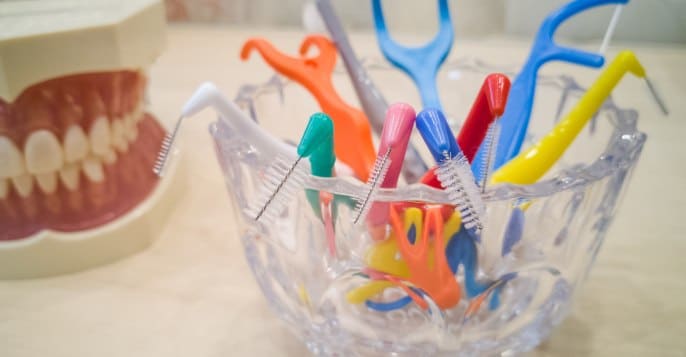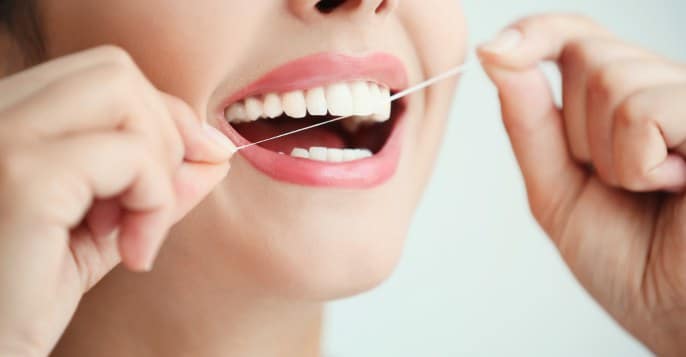Introduction
Optimal oral care is strategy-specific, with a plethora of things to be taken into consideration. Most people brush their teeth regularly but never floss. Brushing cleans the flat surfaces of teeth, considering that it can’t even reach the tight spaces between your teeth.
This is where floss is essential. With different types of floss available, it is normal to wonder which types of floss to use, how to floss your teeth correctly, and how often should you floss. Don’t worry we have got everything covered, If you’re curious about the benefits of flossing, keep reading.
What are the benefits of flossing?
We all love that satisfying feeling of dislodging food stuck between our teeth. But beyond instant gratification, flossing offers numerous benefits. Discover 10 benefits of flossing:
1. Prevents cavities
Although most of the factors contributing to caries are not under our control, food particles caught between teeth are a major causative factor that we can do something about. More importantly, caries is an irreversible process – which means, that once the cavity is formed, the tooth cannot be restored but can be repaired.
So prevention becomes important. Flossing removes food particles from areas the brush can’t reach, thereby reducing your risk of cavities.
2. Removes plaque, tartar, and oral build-ups
Plaque is a silent offender of oral health. You see, plaque starts forming within minutes after you brush your teeth. Now, consider how much of this can accumulate in the difficult-to-reach areas, such as crevices around your teeth. This nasty film harbors bacteria that create damaging acids that are responsible for gum and tooth diseases. Flossing helps remove these build-ups making this one of the key benefits of flossing.
3. Prevents potential loss of teeth
You’ve heard it right: flossing can prevent tooth loss.
Plaque, a sticky film, and its calcified form, calculus, are the prime causes of gum disease that can result in tooth loss. Flossing helps break up the accumulation of these damaging materials thus extending the life of your teeth. As they say “An ounce of prevention is worth a pound of cure.” Flossing is your ounce of prevention for long-term oral health.
4. Decreases bad breath
Bad breath is most commonly treated with strong mouthwashes, but what if the culprit was all that stuff stuck between your teeth? Food, decay, and gum disease are the three biggest dental causes of bad breath. Flossing helps you prevent all that, and you may be surprised to find you have much fresher breath with regular flossing
5. Helps with diabetes management
It’s true-your mouth can give clues on your overall health status. In some cases, the presence of disease can lead to oral health problems, and in other cases, treating these oral health problems can help to maintain the very same disease. Diabetes is a good example of this two-way relationship
Other benefits of flossing include –
6. Improved Gum health: By keeping the invaders at bay.
7. Helps with cardiac health: Studies prove that people with diligent oral hygiene care are less prone to cardiac problems
8. Improves overall aesthetics: Prevents yellow hardened calculus, thereby improving appearance
9. Saves money: Flossing today can help you save the money you spend on dental treatments.
10. Boost your confidence: A healthy smile is always a confidence booster.
Types of Floss
There are many different types of flosses available in the market. Common types include:

- Waxed floss: This floss is coated with wax, which makes it easier to slide between teeth that are tightly spaced.
- Unwaxed floss: Thinner than waxed floss, this types of floss can reach between tighter spaces easily but may be harder to use.
- Dental tape: It’s wider and flatter than floss so can make more effective contact with the larger gaps between teeth with gaps.
- Super floss: It’s made for people with braces or dental implants. One end of the floss is stiff to thread under dental appliances.
Factors to Consider
Teeth contacts: Waxed or unwaxed floss might work better for you if you have very tight teeth, while dental tape could work better for you if you have wider gaps between your teeth.
If you have braces or dental implants you might need super floss.
No single types of floss is considered to be the best. From a personal perspective, the ultimate argument is that you should be willing to use it regularly.
How often should you floss?
Standard dental guidelines recommend brushing your teeth twice a day for about two minutes each time and flossing at least once daily. This habit keeps plaque at bay thereby avoiding cavities and improving oral health.
How to Floss your teeth Properly
The following steps will guide you on how to floss correctly:
- Use 18 inches of floss: Wind most of the floss around your middle fingers, leaving about an inch or two to work with.
- Gently slide the floss between your teeth: Use a gentle sawing motion to get the floss between your teeth.
- Curve the floss into a C-shape: As you reach the gumline, curve the floss into a C-shape around one tooth, and slide it gently up and down the side of the tooth.
- Clean both sides of each tooth: Repeat on the other side of the tooth.
- Floss all your teeth: Do this for each of your teeth, using a new part of the floss for every tooth.
- Note: Do not snap the floss against your gums.
Key takeaways
- Flossing is integral to the best possible oral health, as it removes plaque and food particles brushing alone can’t catch.
- Provided it is done regularly, flossing could help you avoid most tooth-related evils: cavities, gum disease, and bad breath.
- With all that comes improved overall health through a reduced risk for systemic diseases affiliated with oral health.
- Consistency is the key: You can only avail the maximum benefits of flossing with consistency.
Note: For personal advice on flossing techniques and which floss is best for your oral health needs contact our expert dentists only at Orthosquare! Book your appointment now.






